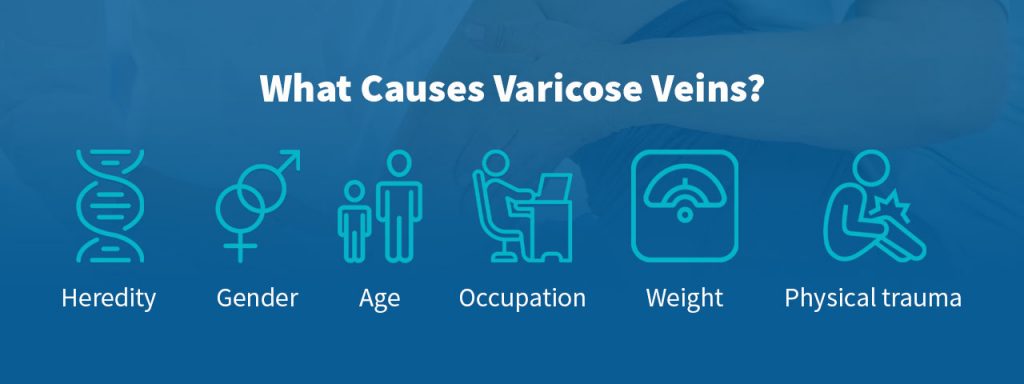
Inherited traits play a major part in how we look; complexion, eye color, the shape of the face, and so many other traits are influenced by genes passed down from our parents. Our appearance isn’t the only thing that can be hereditary—varicose veins and vein health can be too. If one of your family members has developed varicose veins in their lifetime, it’s possible that you may end up visiting a vein specialist later in life. Don’t worry—venous insufficiency is a common problem that affects up to 40 million people in America, and easy, noninvasive treatment options are available to help those with varicose veins feel confident about their legs again.
Genetics can be a huge indicator for whether someone will develop varicose veins. Due to both structural and metabolic similarities, up to 80% of cases can be attributed to genetics. Environmental factors can also play a huge role in developing varicose veins. Add the two together, and it may seem like inheritance is an inevitability. This doesn’t necessarily have to be the reality. We cannot control our genetics, but we can have some control over our environment.
Varicose veins are caused by poor vein health. Our vein valves work harder in our lower legs to push blood upward against the flow of gravity. If these valves are weakened or damaged, blood can pool in the vein, causing a varicose vein to form. In some cases, the daily wear and tear that life puts on our bodies can cause these valves to break down. In other cases, genetics can be the deciding factor.
We all inherit traits from our parents — some good, some bad. It’s possible for certain individuals to have fewer valves than normal in their veins or have valves that don’t function as well as they should. Other individuals may have abnormalities in their vein wall that can leave the valves more likely to be damaged. These traits are likely to be passed down to children, leaving them more at risk of developing varicose veins later in life.

Weight gain and active consumption of unhealthy foods can lead to blockages in the veins—the exact environmental factor that needs to be avoided to ward off varicose veins. Steer clear of greasy, fatty foods with little nutritional value, as well as soda and other treats packed with sugar. Your body as a whole will thank you, not just your veins.
Your vein valves need to stay strong to effectively control blood flow. If they weaken or break down, then varicose veins can form. Exercise can be a great way to improve your circulate and strengthen those vein valves so that they can do their job properly. If you don’t have the time or money to run to the gym, don’t worry—a daily stroll around the neighborhood can be a huge help in strengthening those veins. If you have access to a pool, then consider taking some time to go swimming. It’s a relaxing, low-impact exercise that also strengthens the legs.
Diet and exercise can’t be inconsistent. One healthy meal a day is not enough, and one long monthly walk won’t be as helpful as a daily short one. To best help your veins, pick a routine and stick to it. Make sure you’re drinking enough water daily as well, as water is critical to keep your body functioning properly. If you work in an office, take some time to get up and take a quick walk; sitting for too long can also have negative consequences for your venous health.
We’re not always immediately aware of when something is happening to our body. Your doctor, however, is better equipped to figure out if everything in our body is working as it should. If you’re not seeing your doctor for a yearly checkup, then you may be missing out on the opportunity to treat an underlying problem before it has the chance to become a nuisance. You can speak to your doctor about any concerns you have about developing varicose veins, and together you can keep an eye on any changes in your veins that may occur—and treat them early.
Remember that, despite your best efforts, gravity and your genes may still win and you will need treatment. Now, that doesn’t mean that you give up and not take proper precautions! Following the above tips will still help keep you ahead of the curve and lessen your risk. However, if you do start noticing discolored, visible veins under the skin, it’s time to seek out a specialist.
Varicose veins may seem to be a nuisance rather than a serious health concern. This may be true for some, but keep in mind that undiagnosed and/or untreated venous insufficiency can lead to problems later. Best case scenario, these problems are only annoying—worst case scenario, they’re life threatening. Vein valves can start leaking once they’ve broken down, which irritates the skin and causes an ulcer. Blood clots can also form in varicose veins that can quickly travel to the lung and cause a pulmonary embolism—a deadly condition that can be avoided if varicose veins are treated early.
Diagnosis is, of course, the first step to taking care of venous insufficiency. Please visit a specialist for a consultation if you’re concerned about your venous health. They will look at your medical history and the current state of your veins to put together a treatment option that will be best suited to your needs. The sooner you get your veins checked, the sooner you can enjoy pain-free legs post-treatment—and the less likely you are to suffer complications from untreated varicose veins.
Venous insufficiency is not something that will go away if you ignore it, but some may be concerned about treatment and wonder whether the treatment is affordable, as well as if treatment will be painful or require a long recovery period. Fortunately, current mainstream treatment options are effective, relatively painless, and require minimal downtime. Most insurance plans will also cover the cost of treatment as long as it isn’t entirely cosmetic.
At the end of the day, there’s only so much we can do to stave away venous insufficiency. We may or may not have a genetic disposition. We may do our best to eat right and stay in shape. Sometimes our veins break down anyway over time. The vein specialists in Orlando understand how frustrating it can be to develop varicose veins. That’s why we’ve dedicated ourselves to treating venous insufficiency. We understand that each patient has their own history and their own needs, and we adjust our treatment plans accordingly so that our patients can enjoy the medical care that they deserve. An examination at the earliest signs of varicose veins can save you from greater frustrations later.